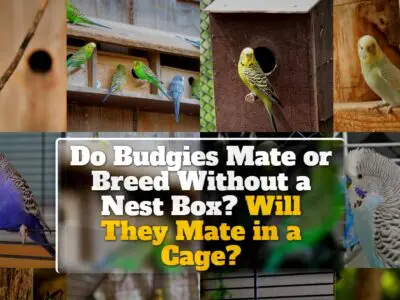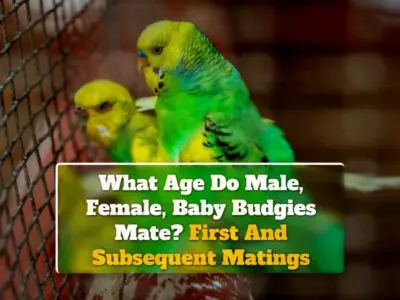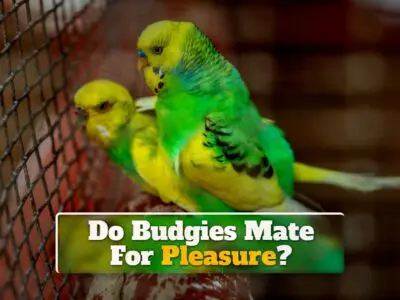Budgies, in their natural habitat, often establish a monogamous relationship with a single partner.
However, individual variations exist, and in some cases, they may seek multiple mates, especially if their current partner becomes unavailable.
This content, an exploration of budgie mating behavior, is designed for bird enthusiasts and budgie owners seeking to comprehend the intricacies of these adorable birds’ relationships.
Based on my experience and studies, I have created this guide to provide insights into the fascinating question: can budgies have more than one mate?
Budgies Typically Form Monogamous Pair Bonds: Budgies Mate For Life
Monogamy is an intriguing behavior observed in budgerigars, more commonly known as budgies.
It plays an essential role in the overall social dynamics of these charming birds.
When we say that budgies typically form monogamous pair bonds, we mean that a budgie usually chooses a single mate to share its life with.
This mate is not just a partner for procreation but a companion in true sense, a cohabitant sharing the nest and taking part in various social interactions.
Understanding this aspect of budgie behavior offers fascinating insights into their complex social structures.
The pair bonding in budgies is a beautiful spectacle.
It involves mutual preening, where budgies groom each other, reinforcing their bond, expressing their affection, and helping each other maintain clean and tidy plumage.
Such activities extend beyond basic grooming and morph into sweet, intimate moments that help cement the bond between the pair.
But the interaction doesn’t stop there.
Budgies also feed each other, a behavior that might initially seem to be an act of parental care.
However, this feeding ritual is an essential part of their courtship and bonding process.
It shows the level of trust and affection between the two birds.
When a budgie feeds its mate, it is saying, ‘I care about your wellbeing.’ It is an intricate and endearing behavior that symbolizes their life-long bond.
The intriguing part is, this monogamy isn’t restricted to the confines of their home or cage.
In their natural habitat, budgies often mate for life.
They establish a powerful bond with their single chosen partner.
This bond is steadfast and endearing, a testament to their monogamous nature.
Budgies, in their natural environment, exhibit these monogamous tendencies by sticking with their chosen partner, nurturing their young ones together, and facing the challenges of the wild in unison.
After Their Partner Die, Budgerigars May Have Other Partner Or Partners
In the wild, the life of a budgerigar is punctuated by elements of uncertainty.
The passing of a partner is a harsh reality that a budgie may face.
Given their monogamous nature, this can be a significant event in the life of the surviving budgie.
A logical question then arises – what happens after the loss of a mate? Would the surviving budgie seek another partner, or perhaps, multiple partners?
To answer this, we need to explore the concept of pair bonds in birds, especially in the context of budgies.
It’s essential to remember that budgies are predominantly monogamous.
However, nature often provides a path for survival and continuation of the species.
If a budgie’s bonded partner were to pass away or become unavailable, the surviving bird might, in some cases, seek another partner.
This is known as re-mating or re-pairing.
There are a few things to consider about this process.
One is that it’s driven by both necessity and the social nature of budgies.
The survival instinct plays a role, but so does their desire for companionship.
Budgies, as we know, are highly social creatures.
A companion provides more than just a chance for procreation.
It offers a mate for preening, a partner in foraging, and a companion to interact with, addressing the budgie’s intrinsic need for social stimulation.
Additionally, while monogamy is their general behavioral pattern, budgies might exhibit polygamous or even promiscuous behavior under specific circumstances.
This shift in behavior usually happens when the budgie cannot find a suitable mate to form a bond.
A lack of potential mates or the absence of a previous mate may trigger this altered behavior.
In these situations, the budgie might pair up with multiple partners over time.
While not common, these behaviors showcase the adaptability of budgies in the face of adversity.
How Long After Their Mate Has Died, Can Budgies Have A New Mate?
The time frame within which a budgie seeks a new mate after the demise of its partner can be challenging to define precisely.
This is largely due to the varying individual behaviors and emotional responses budgies may exhibit.
However, a fascinating study (web.archive.org), conducted in 2011 and published in the journal Animal Behaviour, offers some insight into this intriguing aspect of budgie behavior.
The study showed that female budgerigars continued to show a preference for their respective mates’ calls at 1 and 2 months after separation.
This evidence demonstrates that the auditory memory of the mate’s call was retained for at least 1 month in the absence of stimulation from the mate.
The female budgies’ response preference to their mate’s call, however, ceased after 6 months of separation.
Based on this research, we can hypothesize that if a budgie’s partner dies, the surviving mate might begin to look for a new partner after around six months.
But remember, this is a complex process impacted by various factors, including the budgie’s individual personality, its environment, and its overall health and wellbeing.
As with humans, birds’ reactions to the loss of a partner can vary greatly.
So, while this study provides a fascinating insight into budgerigar behavior, remember that every budgie is unique, and their responses may differ.
Faqs
What Happens If a Budgie Loses Its Mate?
When a budgie loses its mate, it might go through a period of budgie mourning.
These birds form strong bonds with their partners, so the loss can lead to changes in behavior such as loss of appetite, lethargy, or less vocalization.
However, with time, a surviving budgie may form a new bond with a different partner, especially if other potential mates are present.
What Are the Signs That Budgies Are Ready to Mate?
Budgies show various signs when they are ready to mate.
The male bird will often bob his head and strut around the female.
He may also feed her regurgitated food in a behavior known as ‘beak feeding.’ Females, on the other hand, may start shredding materials, a sign that she is ready to build a nest.
Can You Introduce a New Mate to a Budgie Who Has Lost Its Partner?
Yes, you can introduce a new mate to a budgie who has lost its partner.
However, it’s important to do this slowly and carefully to allow the birds to get used to each other.
Initial interactions should be supervised, and each bird should have its own space to retreat to if needed.
Over time, if they show signs of compatibility, they may form a new bond.
Are Budgies In Captivity More Likely To Have Multiple Mates?
In captivity, budgies’ mating behaviors may be influenced by the conditions in which they are kept.
However, even in captivity, budgies generally tend to form monogamous pair bonds.
The occurrence of multiple mates in captivity is not common and is usually driven by specific circumstances, such as the loss of a bonded partner.
Nevertheless, individual variations exist, and certain budgies may exhibit polygamous behavior under specific conditions.



